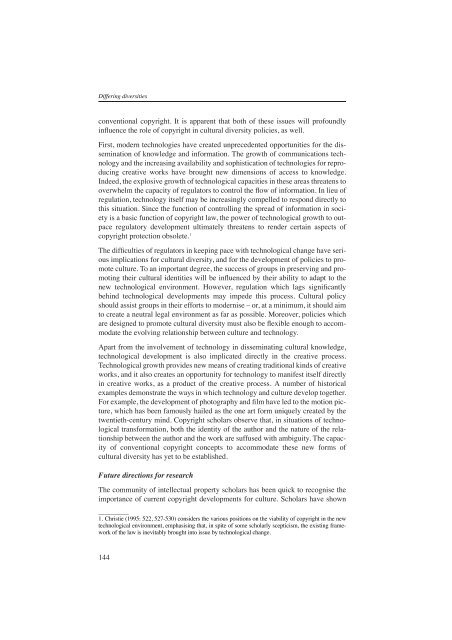<strong>Differing</strong> <strong>diversities</strong>conventional copyright. It is apparent that both <strong>of</strong> these issues will pr<strong>of</strong>oundlyinfluence the role <strong>of</strong> copyright in cultural diversity policies, as well.First, modern technologies have created unprecedented opportunities for the dissemination<strong>of</strong> knowledge and information. The growth <strong>of</strong> communications technologyand the increasing availability and sophistication <strong>of</strong> technologies for reproducingcreative works have brought new dimensions <strong>of</strong> access to knowledge.Indeed, the explosive growth <strong>of</strong> technological capacities in these areas threatens tooverwhelm the capacity <strong>of</strong> regulators to control the flow <strong>of</strong> information. In lieu <strong>of</strong>regulation, technology itself may be increasingly compelled to respond directly tothis situation. Since the function <strong>of</strong> controlling the spread <strong>of</strong> information in societyis a basic function <strong>of</strong> copyright law, the power <strong>of</strong> technological growth to outpaceregulatory development ultimately threatens to render certain aspects <strong>of</strong>copyright protection obsolete. 1The difficulties <strong>of</strong> regulators in keeping pace with technological change have seriousimplications for cultural diversity, and for the development <strong>of</strong> policies to promoteculture. To an important degree, the success <strong>of</strong> groups in preserving and promotingtheir cultural identities will be influenced by their ability to adapt to thenew technological environment. However, regulation which lags significantlybehind technological developments may impede this process. Cultural policyshould assist groups in their efforts to modernise – or, at a minimum, it should aimto create a neutral legal environment as far as possible. Moreover, policies whichare designed to promote cultural diversity must also be flexible enough to accommodatethe evolving relationship between culture and technology.Apart from the involvement <strong>of</strong> technology in disseminating cultural knowledge,technological development is also implicated directly in the creative process.Technological growth provides new means <strong>of</strong> creating traditional kinds <strong>of</strong> creativeworks, and it also creates an opportunity for technology to manifest itself directlyin creative works, as a product <strong>of</strong> the creative process. A number <strong>of</strong> historicalexamples demonstrate the ways in which technology and culture develop together.For example, the development <strong>of</strong> photography and film have led to the motion picture,which has been famously hailed as the one art form uniquely created by thetwentieth-century mind. Copyright scholars observe that, in situations <strong>of</strong> technologicaltransformation, both the identity <strong>of</strong> the author and the nature <strong>of</strong> the relationshipbetween the author and the work are suffused with ambiguity. The capacity<strong>of</strong> conventional copyright concepts to accommodate these new forms <strong>of</strong>cultural diversity has yet to be established.Future directions for researchThe community <strong>of</strong> intellectual property scholars has been quick to recognise theimportance <strong>of</strong> current copyright developments for culture. Scholars have shown__________1. Christie (1995: 522, 527-530) considers the various positions on the viability <strong>of</strong> copyright in the newtechnological environment, emphasising that, in spite <strong>of</strong> some scholarly scepticism, the existing framework<strong>of</strong> the law is inevitably brought into issue by technological change.144
Reasearch position paper 5great eagerness to respond to the challenges which cultural diversity presents forcopyright law and policy. However, with respect to a number <strong>of</strong> key elements inthe relationship between copyright and cultural diversity policies, legal scholarshipremains somewhat ambivalent.The climate <strong>of</strong> uncertainty in research on copyright and culture is a product <strong>of</strong>ambiguities in the international legal environment itself. In the area <strong>of</strong> intellectualproperty law, especially copyright, the current international situation is one <strong>of</strong> constantflux and instability. The fluidity <strong>of</strong> the international copyright regime ismatched by the growth <strong>of</strong> cultural awareness in the international community, andthe prioritisation <strong>of</strong> cultural interests in diverse international quarters – amonghighly industrialised countries, cultural minorities, and developing countries – fordifferent reasons. 1In these circumstances, it is critically important to identify directions for futureresearch which will maintain their relevance for cultural diversity issues in a legaland cultural climate characterised by constant change. These kinds <strong>of</strong> issues canbe located within existing streams <strong>of</strong> scholarship, where changes in the theoreticalorientation <strong>of</strong> research can bring about substantial progress in cultural diversitypolicies. They also arise in relatively underdeveloped areas <strong>of</strong> research, wherescholarship has yet to confront issues which are gradually becoming prominent inthe current legal environment.Impact <strong>of</strong> the internationalisation <strong>of</strong> intellectual property law on cultureScholarship on the legal implications <strong>of</strong> the TRIPs Agreement is substantial.Much <strong>of</strong> this research has been developed by legal scholars and experts, andfocuses on the legislative and administrative implications <strong>of</strong> the TRIPs Agreementfor member states. The impact <strong>of</strong> TRIPs on cultural diversity has also been a subject<strong>of</strong> interest for legal scholars. However, scholarship in this area has yet to providecomprehensive and objective studies <strong>of</strong> the impact <strong>of</strong> TRIPs on culturaldiversity. The issue is primarily <strong>of</strong> concern to developing countries, “transitional”countries, and minority cultural groups, whose cultures <strong>of</strong>ten diverge substantiallyfrom western <strong>Europe</strong>an and American norms. It is perhaps this feature <strong>of</strong> culturaldiversity issues which has led to some neglect by experts who, in their pr<strong>of</strong>essionalcapacities, may identify more closely with the interests supporting the creation<strong>of</strong> TRIPs than with these other groups.Research into the internationalisation <strong>of</strong> intellectual property rights and culturaldiversity stands to benefit greatly from empirical work, which is generally quiteunderdeveloped in relation to intellectual property rights. 2 This is particularly truein the copyright field, where problems concerning incentives to undertake creativework, the nature <strong>of</strong> the relationship between the creation and dissemination <strong>of</strong>__________1. See Drahos, 1999: 358-365.2. Drahos (1999: 363) points out the paucity <strong>of</strong> empirical research on the effects <strong>of</strong> intellectual propertyregulation, with patents being a slight exception. Empirical research on the impact <strong>of</strong> patent law on developingeconomies is presented by Oddi (1987), and by Rapp and Rozek (1990).145
- Page 5 and 6:
PrefaceThe present text constitutes
- Page 7:
Part IDiffering diversities:transve
- Page 11 and 12:
The study: background, contextand m
- Page 13 and 14:
Transversal study on the theme of c
- Page 15:
Transversal study on the theme of c
- Page 18:
Differing diversitiesi. new forms o
- Page 23 and 24:
IntroductionTransversal perspective
- Page 25 and 26:
Transversal study on the theme of c
- Page 27 and 28:
The challenge of diversityCulture,
- Page 29 and 30:
Transversal study on the theme of c
- Page 31 and 32:
Transversal study on the theme of c
- Page 33 and 34:
Diversity, citizenship, and cultura
- Page 35 and 36:
Transversal study on the theme of c
- Page 37:
Transversal study on the theme of c
- Page 40 and 41:
Differing diversitieslanguages. The
- Page 42 and 43:
Differing diversitiesprogrammes int
- Page 45 and 46:
Culture, government and diversity:p
- Page 47 and 48:
Transversal study on the theme of c
- Page 49 and 50:
Transversal study on the theme of c
- Page 51 and 52:
Transversal study on the theme of c
- Page 53:
Transversal study on the theme of c
- Page 56 and 57:
Differing diversitiesin the pursuit
- Page 58 and 59:
Differing diversitiesthe need for m
- Page 60 and 61:
Differing diversitiescircumstances
- Page 62 and 63:
Differing diversitiesclasses artist
- Page 64 and 65:
Differing diversitiesMy point, then
- Page 66 and 67:
Differing diversitiesiii. that the
- Page 69:
Transversal study on the theme of c
- Page 73 and 74:
The consequences of European media
- Page 75 and 76:
Reasearch position paper 1and contr
- Page 77 and 78:
Reasearch position paper 1directly
- Page 79 and 80:
Reasearch position paper 1There hav
- Page 81 and 82:
Reasearch position paper 1presence
- Page 83 and 84:
Reasearch position paper 1Strategic
- Page 85 and 86:
Reasearch position paper 1New media
- Page 87 and 88:
Reasearch position paper 1Blumler,
- Page 89 and 90:
Reasearch position paper 1Hoffmann-
- Page 91 and 92:
Reasearch position paper 1Pauwels,
- Page 93 and 94: Assessing the implementationof cult
- Page 95 and 96: Reasearch position paper 2tics abou
- Page 97 and 98: Reasearch position paper 2Act (GPRA
- Page 99 and 100: Reasearch position paper 2factually
- Page 101 and 102: Reasearch position paper 2The evalu
- Page 103 and 104: Reasearch position paper 2capacity
- Page 105 and 106: Reasearch position paper 2Luchtenbe
- Page 107 and 108: The cultural policies of the Europe
- Page 109 and 110: Reasearch position paper 3went, wou
- Page 111 and 112: Reasearch position paper 3The histo
- Page 113 and 114: Reasearch position paper 3integrati
- Page 115 and 116: Reasearch position paper 3of differ
- Page 117 and 118: Reasearch position paper 3European
- Page 119 and 120: Reasearch position paper 3voice to
- Page 121: Reasearch position paper 3Howe, Mar
- Page 124 and 125: Differing diversitiesContemporary d
- Page 126 and 127: Differing diversitiesWhereas in the
- Page 128 and 129: Differing diversitiesbuilding on th
- Page 130 and 131: Differing diversitieswhen tackling
- Page 132 and 133: Differing diversitiesand that is pr
- Page 134 and 135: Differing diversitiesSennett, Richa
- Page 136 and 137: Differing diversitiesallowing their
- Page 138 and 139: Differing diversitiesNevertheless,
- Page 140 and 141: Differing diversitiesgrowth also ex
- Page 142 and 143: Differing diversitiesAt a deeper le
- Page 146 and 147: Differing diversitiesworks, and the
- Page 148 and 149: Differing diversitiesNational sover
- Page 150 and 151: Differing diversitiesSimilarly, at
- Page 152 and 153: Differing diversitiesCoombe, Rosema
- Page 154 and 155: Differing diversitiesWoodmansee, Ma
- Page 156 and 157: Differing diversitiesIndeed, which
- Page 158 and 159: Differing diversitiesThe second maj
- Page 160 and 161: Differing diversitiesexample by Hol
- Page 162 and 163: Differing diversitiesincreased broa
- Page 164 and 165: Differing diversities“Black Carib
- Page 166 and 167: Differing diversitiesBunt, Gary, 19
- Page 169 and 170: Preserving cultural diversity throu
- Page 171 and 172: Reasearch position paper 7unique, t
- Page 173 and 174: Reasearch position paper 7legislati
- Page 175 and 176: Reasearch position paper 7appropria
- Page 177 and 178: Reasearch position paper 7Indeed, m
- Page 179 and 180: Reasearch position paper 7- means t
- Page 181 and 182: Reasearch position paper 7cyberspac
- Page 183 and 184: Reasearch position paper 7extended
- Page 185 and 186: Reasearch position paper 7It is rec
- Page 187 and 188: Reasearch position paper 7lose loca
- Page 189 and 190: Reasearch position paper 7six proje
- Page 191 and 192: Reasearch position paper 7and innov
- Page 193 and 194: Reasearch position paper 7Programme
- Page 195 and 196:
Reasearch position paper 7Reference
- Page 197 and 198:
Reasearch position paper 7Papers on
- Page 199:
Reasearch position paper 7Swaminath
- Page 202:
Sales agents for publications of th














